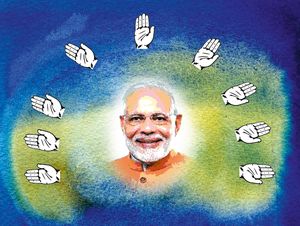An oracle from Raipur cried last Sunday: “Emergence of any third force will provide advantage to the BJP/NDA.”
The oracle was none other than the grand old party of India, which won us the freedom that we have been enjoying for the last three quarters of a century, ruled us for more than half a century, and claims to have built the democratic edifice that allowed us to vote it out several times. Pretty sweet of them, I say.
The party has just elected a new leader after about two decades, but is wary of electing the leader’s executive council, which they call the working committee. It is another matter that on most occasions the working committee, elected or otherwise, hardly works, and leaves it to the president to work out things.
That is okay. It is for the party and its members to decide whether they want to be led by elected leaders, nominated leaders, or NOTA, and whether those leaders would discuss, deliberate, decide, defer or refer things to the president or providence.
The rest of us in the polity are concerned with what the oracle spoke—that a third force will benefit the BJP. The argument has good arithmetic. Going by the votes polled in the last Lok Sabha round, the BJP and allies got 45 per cent of the votes. Which means more than half the voters did not vote the BJP or its allies. Argued further, it means there are more Indians who voted against Modi than there are Indians who voted for Modi.
Yet, how is Modi ruling India? Two reasons. One is systemic—we have a first-past-the-post system. The other is political—the votes polled against Modi’s NDA got split among several parties.
So ladies and gentlemen, let those who want to vote for Modi vote him, but let the rest of us gang up and get all the non-Modi votes. Let us offer just one anti-NDA candidate to every NDA candidate in every constituency. Let there be a Modi front, let there be an anti-Modi front, and let there be no third front. So says the Congress.
Congressmen have their own defeats to cite. They had remained unassailable on their perch for the first 30 of India’s free years till all the non-Congress forces got together in 1977, bagged more votes than they, and kicked them out.
The logic, however, conceals a flaw. It presupposes that India’s voters are of two kinds—those who want Modi to stay, and those who want him out. Unfortunately, Indian politics is no longer as simple as it was in 1977 or 1989, or as in bipolar polities like the US where people vote either for the Democrats or the Republicans.
Indian polity is a complex arena. Players here are not competing for each other’s space; they are competing for one another’s space. Most of the small players are competing for the space that the Congress is occupying in their little turfs. Many may be enemies of the BJP, but they are rivals of the Congress and, in some places, of one another.
Moreover, voters in India are not necessarily divided into Modi voters and anti-Modi voters; there are crores of non-Modi voters too. The Congress thinks that the non-Modi voters can be persuaded to be anti-Modi voters for a one-vote stand.
Dear Congressmen, think twice before going for one-night stands. You have been saying that Modi and his men are seeking to convert India’s political discourse into a we-and-they binary, that they have been making every election, every speech, every rally, every discourse a duel between the BJP and others. And now you are sleep-walking into that trap with no council of elected wise men to debate, discuss or direct you.
prasannan@theweek.in


